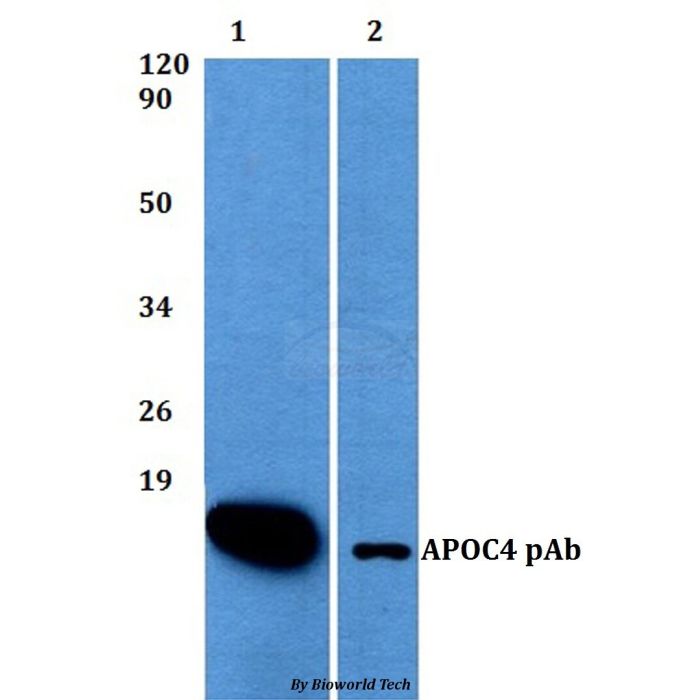APOC4 polyclonal, anti-human, mouse
€305.00
In stock
SKU
BS60500
Background:
Apolipoproteins are protein components of plasma lipoproteins (1). The apolipoprotein C gene family encodes four homologous proteins designated apoC-I to -IV, which specifically modulate the metabolism of triglyceride-rich lipoproteins (2). The human apoC-I gene maps to chromosome 19q13.2 and is expressed primarily in the liver where it is activated when monocytes differentiate into macrophages (3,4). The human apoC-II gene maps to chromosome 19q13.2 and encodes a 79 amino acid single chain protein that is a necessary cofactor for the activation of lipoprotein lipase, the enzyme that hydrolyzes triglycerides in plasma and transfers the fatty acids to tissues (5–7). The human apoC-III gene maps to chromosome 11q23 and encodes a protein that may delay catabolism of triglyceride-rich particles by inhibiting lipoprotein lipase and hepatic lipase (8). The human apoC-IV gene maps to chromosome 19q13.2 and encodes a 127 amino acid protein that is primarily expressed in the liver (9,10).
Alternative Name:
Apolipoprotein C-IV, Apo-CIV, ApoC-IV, Apolipoprotein C4, APOC4
Application Dilution: WB: 1:500~1:1000, IHC: 1:50~1:200
Specificity: APOC4 polyclonal antibody detects endogenous levels of APOC4 protein.
Immunogen:
A synthetic peptide corresponding to residues in Human APOC4.
MW: ~ 15 kDa
Swis Prot.: P55056
Purification & Purity:
The antibody was affinity-purified from rabbit antiserum by affinity-chromatography using epitope-specific immunogen and the purity is > 105% (by SDS-PAGE).
Format:
1 mg/ml in Phosphate buffered saline (PBS) with 0.05% sodium azide, approx. pH 7.13.
Storage:
Store at 4°C short term. Aliquot and store at -30°C long term. Avoid freeze-thaw cycles.
For research use only, not for use in diagnostic procedure.
Apolipoproteins are protein components of plasma lipoproteins (1). The apolipoprotein C gene family encodes four homologous proteins designated apoC-I to -IV, which specifically modulate the metabolism of triglyceride-rich lipoproteins (2). The human apoC-I gene maps to chromosome 19q13.2 and is expressed primarily in the liver where it is activated when monocytes differentiate into macrophages (3,4). The human apoC-II gene maps to chromosome 19q13.2 and encodes a 79 amino acid single chain protein that is a necessary cofactor for the activation of lipoprotein lipase, the enzyme that hydrolyzes triglycerides in plasma and transfers the fatty acids to tissues (5–7). The human apoC-III gene maps to chromosome 11q23 and encodes a protein that may delay catabolism of triglyceride-rich particles by inhibiting lipoprotein lipase and hepatic lipase (8). The human apoC-IV gene maps to chromosome 19q13.2 and encodes a 127 amino acid protein that is primarily expressed in the liver (9,10).
Alternative Name:
Apolipoprotein C-IV, Apo-CIV, ApoC-IV, Apolipoprotein C4, APOC4
Application Dilution: WB: 1:500~1:1000, IHC: 1:50~1:200
Specificity: APOC4 polyclonal antibody detects endogenous levels of APOC4 protein.
Immunogen:
A synthetic peptide corresponding to residues in Human APOC4.
MW: ~ 15 kDa
Swis Prot.: P55056
Purification & Purity:
The antibody was affinity-purified from rabbit antiserum by affinity-chromatography using epitope-specific immunogen and the purity is > 105% (by SDS-PAGE).
Format:
1 mg/ml in Phosphate buffered saline (PBS) with 0.05% sodium azide, approx. pH 7.13.
Storage:
Store at 4°C short term. Aliquot and store at -30°C long term. Avoid freeze-thaw cycles.
For research use only, not for use in diagnostic procedure.
| Is Featured? | No |
|---|
Write Your Own Review

